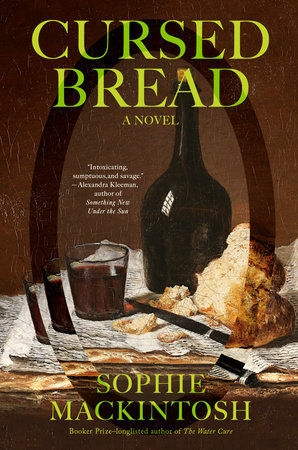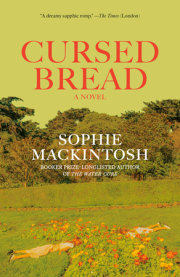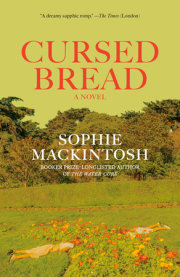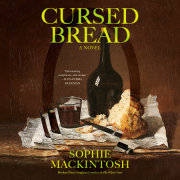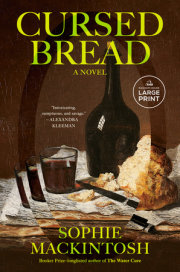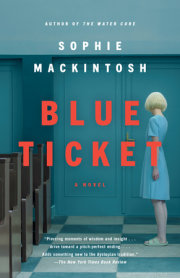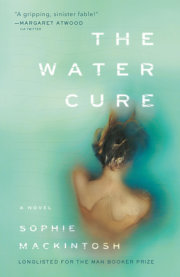When I recall the first time I met Violet, it embarrasses me. I hold the memories up to the light and think—did it really happen like this? And even if it did, why not tell it differently? More generously? Why don’t I pretend, even to myself? There’s nobody left to know, nobody who could catch me out. I could say that she came in and took my hands in hers and looked into my eyes and said she always wanted a friend, a true friend, that she could see we were alike, with twin ravaging hearts under our ribs. My dour blouse could not conceal that from her. I could say that she picked me out of everyone in the town, was drawn along the sun-bleached stone of the pavements by hunger, by instinct, to where I had always stood, waiting.
I could say a lot of things, but perhaps it’s best to be honest, now. I didn’t sense her walking towards me on that chill morning in early spring, didn’t notice her opening the door to the bakery. Her hair was dark and loose, spilling over her stiff white blouse and the lace at its collar. She hung behind the other customers, looking at the loaves stacked behind me one by one as if making an important decision. The other women in the shop greeted her. Welcome, they said. We’ve been expecting you. She smiled at that, and I had to stop myself from brushing my hand against hers when I passed her the loaf she finally chose, but I couldn’t say much to her, I was afraid of her. She thanked me and left, and through the window I saw her pause and open the paper bag for a second, as if she was considering tearing into the bread like a dog. But she didn’t. She closed the bag, and then was gone. I stared after her until the next customer, I don’t remember who, interrupted me, impatient for their breakfast. You’ve seen a ghost, they joked, snapping their fingers.
When I returned home later I found my husband asleep on our bed. He slept like a baby, insensibly, with his arms thrown out. I passed my hands over his body, not quite touching, along those splayed arms and along his legs, and finally, gently, lowered my palms to his chest. He was fully dressed. I climbed onto the bed, folded myself on top of him. His breathing changed but he refused to admit he was awake. Please, I asked him. I pressed my face into his neck. He was sweating. I wanted to put my hand over his mouth so he would stop pretending, but I knew he would rather suffocate than be caught. He kept his eyes closed. I batted at his arms, his cheeks, very lightly, then less lightly, then not very lightly at all.
I can admit that in those days I was sometimes jealous of the dough my husband put his hands into, worked so tenderly and tirelessly with, up to the elbows. I can admit now that his bread really was the best. There was such beauty in breaking it open hot from the oven and the steam pouring out, in feeling your appetite worrying at you and knowing it would soon be sated, the astonishing fact that, living as we did in this new time of peace and plenty, we might never have to feel truly hungry again. He was on a constant mission to perfect it. You might have said it was his life’s work. You might have said this not entirely seriously, but he was very serious about it. I was jealous too of the purity of his focus, the incremental moves towards one faultless loaf. But then what, when there was nothing left of the bread to improve? What then. Eat of it and be filled. Eat of it and be transformed. Eat of it and nothing changes. The almost-imperceptible recalibration of our desire, our satisfaction. Try again.
In the days that followed our first meeting, Violet haunted my thoughts. Would anyone believe me if I said I felt an intimacy with her even then? Would they believe that somewhere inside myself I knew what she would become to me? It was in the loaves I saved for her, whorled with flour. In the outfits I started to select the evening before, hanging on my cupboard door like bodies in the dark. In the slivers of information I prised out from her, prised out from the others. The matrons watched my little stabs at conversation when she came into the bakery, all my words running into each other. I was trying to be funny, showing off. We had lived in the same city for a while. We might have passed each other in the street. Through the slow afternoons I pictured her journey to us: a shining green car heading out of the city, stops on the way for her to look at the flowers in the fields. I started to wear a brooch that I had bought in that same city many years ago—pinning it to my chest like a signal. But her eyes upon it made it seem garish and unfashionable, she smiled at me without showing her teeth, and in a fit of rage I put the brooch in the bin when I closed the shop one day, sat behind the counter and cried. What have you got to cry about? my husband asked when I got home that night. He poured me a glass of milk. We live a very good life, he told me, cutting himself a thick slice of bread to eat with cheese, and it was true.
Every day I waited for her to come in, without knowing why, without knowing what I would do. Finally, a couple of weeks after she arrived, though it felt like much longer, she put a hand in her pocket one morning and drew out a piece of paper, slid it across the counter. Blue ink, the handwriting of a man. We’re having a party to meet everybody, she said. Won’t you come along? She gave me the benediction of her smile. I felt my own lips respond involuntarily. I looked down at my hands, sticky, crumbed. We’ll come, I told her.
The first time I saw the ambassador was at the lake. It was a small one, surrounded by trees, a little way out of the town. A hollowed-out copse of trees, the grass flattening vaguely into a path hardly wider than the tracks of a fox in the night. I would go there to swim just after dawn, to avoid the sinister children who threw clots of mud later in the day. Like sprites who might hold me under the surface and drown me at any moment. In the early morning I could slip my body into the world unnoticed, slip it into cold water, silken with mud, this body otherwise covered up with old cloth, apron, perfume, with layer upon layer. But that day a movement up ahead stopped me in the grass, made me press my body, still clothed, to a tree. A man, completely naked. I could see his clothes folded neatly on the ground behind him. He hadn’t seen me. He hunched his shoulders up towards his ears, loosened them, stretched his arms out in front. It was quite cold. Perhaps he was gathering courage, I thought.
He walked into the cool water until he was up past his waist, raised his arms and pushed himself in. Until he surfaced, I held my breath. I would give anything to go back and see his body for the first time again. The shock of pale, unfamiliar flesh against green leaf, the hair wet against his head. Standing on the shore he had looked forbidding, even naked as he was, but the water washed something away from him. He became soft, glowing. He swam long and languid, and I thought of all the bodies I had known, how they had fitted or not fitted into mine, skin and breath on skin, and I lay down in the grass with the wings of the insects beating in my ears, so he wouldn’t see me. I lay until the sound of the water stilled, until I was very sure that he was gone.
Dear Violet,
It has been a year now in this convalescent place by the sea. Elderly widows and tired mothers lounge in their deckchairs on the beach, or stroll the promenade; the white paint of the buildings blisters with salt. You would never willingly come somewhere like this, which perhaps is why I feel safe here. A year of the rain tapping on the window and the hotplate in the corner upon which I sometimes consider laying my palm, though the most I ever do is drop a strand of my hair to watch it curl and smoke. I walk up and down the concrete at the seafront counting the crabs that the seagulls have smashed on the floor, comforted by the horrible way the birds address their own hunger—almost inspired by it on some days.
The policemen sit with me in my room and I make them coffee in the two cups I own. They always want me to give my account of events. I should have some fun with it, tell them something different every time, but instead I don’t tell them anything because there’s nothing really to tell, because I want them to leave me alone. I make sure they cannot see my hands shaking. My hands are where it shows. Papery rucked skin. They don’t do much of anything now, but the skin remembers, the body holds everything inside itself, the bones can still stiffen to claws. One of the policemen I think of as kind; I can tell he pities me. He says my name, then says it again—Elodie—and this makes the less kind policeman put his cup down so that it rattles. Sorry, sorry, I tell them. I’m listening, I tell them, though it’s a lie. What I am really doing is watching the sand and rain blow against the window, and how the happy families run easily to safety, striped umbrellas held like weapons. Soon the policemen finish their coffee and they go. I won’t talk, because the only real truth I could tell them is that sometimes there is a switch, and the world is turned upside down.
This is what it’s like here: I do my penance. I slide my silver coins over the counter of the café and darn my stockings and at night my eyes are swollen little beads. I am a woman talking to myself alone in a room and I am a woman mute in a police station and I am a woman in a bar who nobody pays any attention to. I am a woman talking to you all of the time, wanting to feed words back to you, because you gave me so many, pushed them down my throat until I choked and enjoyed the choking, until the words spread through my blood, until I lit up. I think in another life I could have been a pathological liar, a professional one. I could have kept audiences rapt, could have talked my way out of and into things, rather than listening, watching, ruminating until I drive myself really mad. I always did imagine the two of you as characters from a story, after all.
Copyright © 2023 by Sophie Mackintosh. All rights reserved. No part of this excerpt may be reproduced or reprinted without permission in writing from the publisher.

